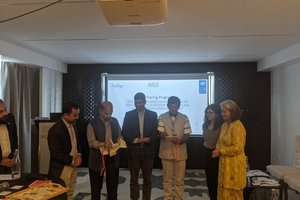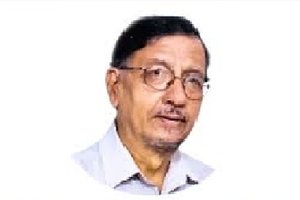Keshab Poudel
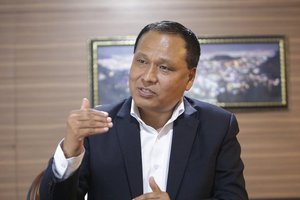
NEPAL - INDIA ENERGY TRADE: A Significant Achievement
Faced with the challenge of managing approximately 1100 MW of surplus electricity and mitigating potential losses during a five-month interim period, Kul Man Ghising, Managing Director of Nepal Electricity Authority (NEA), expressed relief following India's approval to import electricity from Nepal at a rate of Rs 8.72 per unit. Indian Foreign Secretary Dr. S. Jaishankar described the agreement to export 1000 MW of electricity to India as a significant achievement.
By Keshab Poudel Aug 27, 2024
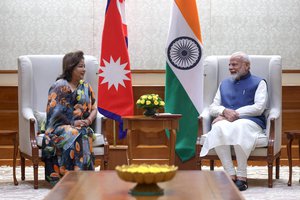
FM Dr. Arzu Rana Deuba’s India Visit: Strengthening Diplomatic Ties
Through skillful management and careful articulation of the prevailing issues between Nepal and India, Foreign Minister Dr. Arzu Rana Deuba successfully completed her inaugural mid-term official visit to India, a close neighbor of Nepal. This visit was particularly timely, coinciding with significant unrest in Bangladesh that led to the ousting of a secular prime minister, alongside rising mob violence against minority Hindus and temples, which posed security concerns for both Nepal and India and raised the potential for a large-scale refugee crisis. India's decision to permit the export of 251 MW of electricity from Nepal reflects a positive gesture in response to Dr. Rana's visit.
By Keshab Poudel Aug 25, 2024
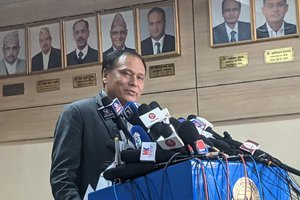
NEA’S 39Th Anniversary: Kul Man Ghising, A Cool Man
For seven years, Kul Man Ghising has served as the Managing Director of the Nepal Electricity Authority (NEA), during which he has significantly revitalized Nepal's electricity sector, ensuring that electricity is both affordable and reliable. Under his leadership, the NEA has successfully eliminated long-standing load shedding issues and has made substantial advancements in the generation, transmission, and distribution of electricity across the nation over the past eight years. One of his most notable accomplishments is transforming Nepal from a net importer of electricity to a net exporter, achieving an annual profit of Rs. 12 billion. Despite facing provocations, character attacks, and pressures from both known and unknown adversaries, MD Ghising has consistently demonstrated composure and professionalism. In a recent press conference attended by 300 journalists and broadcast live with over 200 cameras, he exemplified humility and respect, expressing gratitude to Prime Ministers, Ministers, senior officials, and his entire NEA team for their collective achievements. As the NEA commemorates its 39th anniversary on August 17, MD Ghising, who has turned a loss of Rs. 34.61 billion into a cumulative profit of Rs. 47.41 billion last year, continues to embody the qualities of a distinguished leader in a challenging environment
By Keshab Poudel Aug 17, 2024
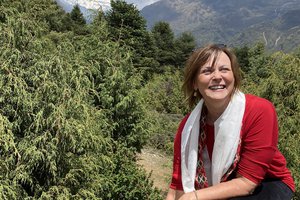
Felicity Volk: An Envoy Of Compassion
Felicity Volk, the Australian ambassador to Nepal, commenced her tenure three years ago with little known person. Through her gentle demeanor, sociable character, and community-focused initiatives, Ambassador Volk has effectively demonstrated the significance of Australian support for Nepal, thereby earning the admiration and trust of the Nepali people.
By Keshab Poudel Aug 11, 2024
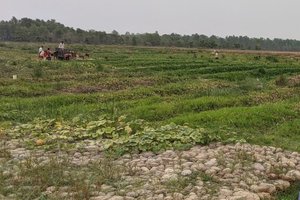
HELVETAS-NEPAL’S RIVERBED PROJECT: Brining Three Tires Of Governments Together
Helvetas-Nepal's Riverbed Farming Project (RbF) has shown that involving various stakeholders including local level and provincial level governments in a partnership significantly enhances the project's sustainability.
By Keshab Poudel Aug 07, 2024
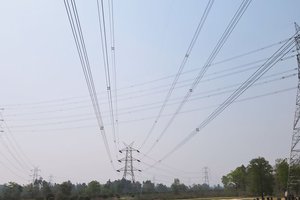
NEPAL: Net Exporter Of Electricity
Nepal has successfully transitioned from being a net importer of electricity to a net exporter, with a value of Rs. 17 billion. Kul Man Ghising, the Managing Director of Nepal Electricity NEA has effectively dispelled the long-standing narrative that exporting electricity to India was merely a myth.
By Keshab Poudel Jul 29, 2024
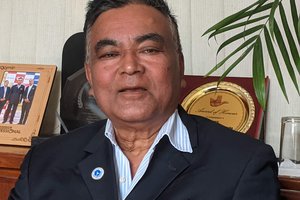
Monetary Policy Fails To Address Hotel Industry: Binayak Shah
With extensive experience in the hotel and tourism industry, BINAYAK SHAH, President of Hotel Association Nepal (HAN), possesses in-depth knowledge of Nepal's tourism sector. While industrialists and bankers celebrate the announcement of monetary policy 2081, the tourism sector expresses disappointment and frustration. Shah discussed various issues concerning the tourism sector and the newly released monetary policy with KESHAB POUDEL. Here are the highlights of their conversation
By Keshab Poudel Jul 29, 2024
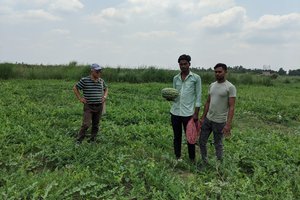
HELVETAS NEPAL’S RIVERBED FARMING: Shift From Overseas To Local Farming
The introduction of riverbed farming (RBF) in eastern Nepal has not only brought financial stability, but also significantly reduced the number of people seeking work abroad in Jhapa and Morang districts of Koshi province.
By Keshab Poudel Jul 26, 2024
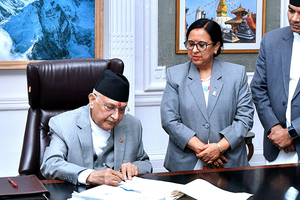
POLITICAL SCENARIO : K.P. Sharma Oli's Resurgence
Renowned for his populist rhetoric, K.P. Sharma Oli, the leader of the Communist Party of Nepal - United Marxist Leninist (CPN-UML), is embarking on his fourth term as prime minister, leading a cabinet of 21 members from a coalition of four political parties. Positioned between the two major regional powers of Asia, India and China, Oli faces a challenging task in navigating the diplomatic relations with his neighboring countries. Similarly, he is confronted with a complex situation in managing the Nepali Congress, his competitive party and coalition partner, which presents a daunting and intricate situation. His initial visible challenge is to establish trust with India, particularly its southern neighbor, and with the Nepali Congress, his new ally and longstanding rival. Regardless of political claims, the countdown to the start of this government has already begun, as all previous governments in Nepal have.
By Keshab Poudel Jul 21, 2024
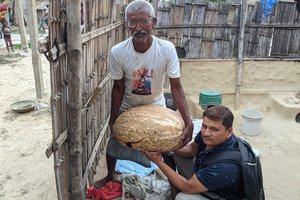
HELVETAS NEPAL: Nutrition Through Riverbed Farming
The introduction of River Bed Farming (RbF) by Helvetas-Nepal has been a pivotal moment in improving the nutritional well-being of the children, pregnant women, and the elderly of backward, poor and under privileged communisis living in Madhesh, Koshi and Sudur Paschim Provinces . This innovative farming technique has not only provided a means for supplemental income but has also become a vital source of nutrition and food security for the community.
By Keshab Poudel Jul 18, 2024
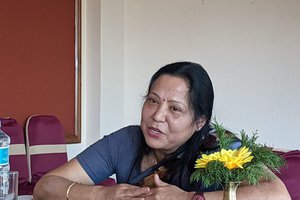
NOU Opens To All: Dr. Shilu Manandhar Bajracharya, Vice Chancellor
Throughout her career, Dr. Shilu Manandhar Bajracharya, who has served as a distinguished professor of Management at Tribhuwan University for her entire tenure, has shown that commitment and a collaborative approach can significantly alter circumstances. For over four years, she served as the dean of the Management and Law Faculty before being appointed as the Vice Chancellor of Nepal Open University (NOU) two years ago. She has discussed the university's progress towards modernity, her dedication to the university's long-term growth, and the development of its human resources to ensure NOC becomes a leading, sustainable higher education institution. As vice chancellor, Dr. Bajracharya has emphasized the importance of online education for future crisis management, such as during pandemics like COVID-19. Throughout her career, Dr. Bajracharya has exemplified herself as a role model and a distinguished individual. As the first female vice chancellor of NOU and the second female vice chancellor in Nepal, she has shared insights into the university's progress and her vision for its future with New Spotlight.
By Keshab Poudel Jul 15, 2024
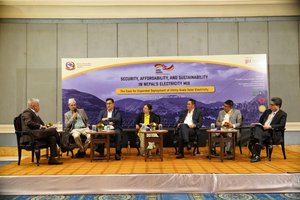
NEPAL ELECTRICITY MIX: Solar Power Is The Choice
There is a general agreement among government officials, the private sector, and Nepal's development partners on the importance of increasing the share of solar power in the country's electricity mix. However, there are differing opinions, especially regarding the solar power tariff cap.
By Keshab Poudel Jul 12, 2024
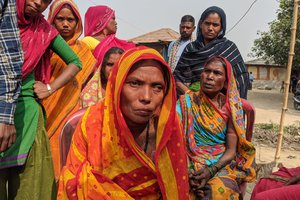
HELVETAS NEPAL’s RIVERBED FARMING Empowering Women
In the underprivileged, landless, and land-poor areas of the Terai region in Nepal, the impact of Riverbed Farming (RbF) in empowering women is evident. Hundreds of women have risen from socio-economic disadvantages to become leaders within their communities, thanks to the support and empowerment provided by RbF.
By Keshab Poudel Jul 10, 2024
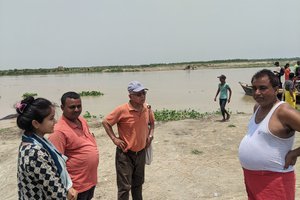
HELVETAS-NEPAL’s RIVERBED FARMING: Climate-Adaptive And Resilient
Due to shifts in climate, leading to heightened rainfall, there has been an increase in the frequency of floods and soil erosion in the Rautahat district of Madhesh Province. In collaboration with Helvetas-Nepal, and in partnership with the Friends of Change in Nepal, a local Non-Governmental Organization (NGO), has been working to enhance the resilience and adaptive abilities of farmers, thereby improving their annual incomes and reducing erosion in the flood-prone areas of the Bagmati and Lalbakiya Rivers.
By Keshab Poudel Jul 08, 2024
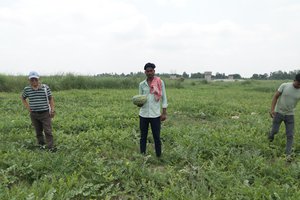
HELVETAS-NEPAL/ RIVERBED FARMING: A Path To Hope In Kankai River
For generations, impoverished and overlooked communities situated on the banks of the Kankai River in the ward 6 of Kankai Municipality, located 600 kilometers southeast of the capital city, Nepal, have endured constant turmoil and destruction from the river. However, with the introduction of the River Bed Farming (RbF) project by Helvetas Nepal in 2016, the rich soil, sand, and water from the annual flood of the Kankai River have played a significant role in uplifting the lives of these communities, moving them from poverty to wealth, and filling their lives with joy and contentment. The RbF program, spearheaded by Helvetas Nepal in collaboration with local NGOs such as Forward and the district governments, has effectively shown how the unused flood-prone banks of rivers, which mainly stem from the northern high hills, can be utilized to not only alleviate suffering but also to foster prosperity and happiness within rural communities. These communities, which have been plagued by the yearly devastation caused by the Kankai River, have managed to transform the disaster into a stepping stone towards prosperity.
By Keshab Poudel Jul 05, 2024
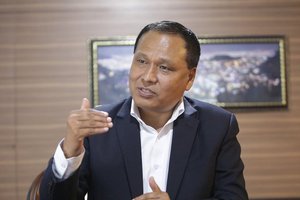
ENERGY TRANSITION: Nepal's LPG Import Decline
The decrease in Nepal's LPG imports can be attributed to the enhancement of electricity supply. The recent commissioning of the 400 kV Inaruwa-Dhalkebar transmission line by the Nepal Electricity Authority (NEA), along with the ongoing progress in the Dhalkebar-Hetauda section, is set to improve the overall power supply quality in the nation. Consequently, the import of LPG, which began two years ago, is anticipated to witness a further decline in the upcoming year.
By Keshab Poudel Jul 02, 2024
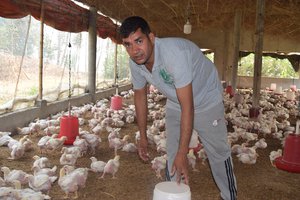
IFAD/ MOICS SAMRIDDHI : Returnee Migrants Find New Beginnings
Implemented jointly by the International Fund for Agricultural Development (IFAD) and the Ministry of Industry, Commerce, and Supply (MOICS), technical skill training provided by Helvetas-Nepal, a partner of the Rural Enterprises and Remittances Project (RERPP) Samriddhi, has demonstrated that equipping returnee migrants with skills can successfully facilitate their reintegration. Under the Decent Job initiative, Helvetas-Nepal offers Technical and Vocational Education and Training (TVET), integrating three key skill areas. Annually, around 500,000 Nepalese return home seeking employment, and TVET under the Decent Job initiative offers a viable solution for their integration.
By Keshab Poudel Jun 26, 2024
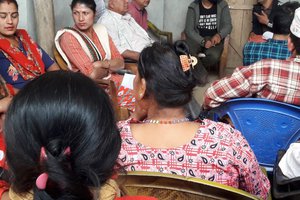
IFAD/MoICS/SAMRIDDHI Empowering Communities Through Financial Inclusion
Ensuring financial inclusion is essential to reduce poverty and inequality and achieve prosperity. The Rural Enterprises and Remittance Project (RERP) Samriddhi, jointly implemented by the International Fund for Agriculture Development (IFAD) and the Ministry of Industry, Commerce and Supply (MoICS), has demonstrated this by increasing access to the financial sector for poor and marginalized communities, women, returnee migrants, and migrant families. These groups contribute significantly to overall prosperity. Under the Financial Education and Entrepreneurial Knowledge (FEEK) program, which includes FEEK-1 and FEEK-2, the project had conducted numerous training sessions aimed at promoting financial inclusion and increasing access to finance in targeted areas. Dhangadhimai Sana Kisan Krishi Sahakari Sanstha Ltd, a beneficiary of the project from the Siraha District of Madhesh Province, has become an exemplary cooperative by implementing policies that enhance financial inclusion and expand access to finance.
By Keshab Poudel Jun 24, 2024
Latest Updates
- RPP Leaders Mishra and Rana allowed to be detained for 5 days
- 1 day, 21 hours ago
- Nepal Sichuan Trade Exchange Month begins
- 2 days, 9 hours ago
- KMC Imposes Rs 793,000 Fine On Former King Shah
- 2 days, 9 hours ago
- AEPC Helds A National Symposium On Carbon Finance Investment Opportunities in Energy Projects
- 3 days, 10 hours ago
- Police Fired Tear Gas To Control Pro-Monarchst Movemnet In Tinkune
- 4 days, 3 hours ago
- ANNFSU Revolutionaries hold torch procession to protest Kulman Ghising's dismissal
- 5 days, 9 hours ago
- PM Oli, Deuba And Prachanda Discuss transitional justice
- 1 week ago
- Kulman Ghising Sacked By Government
- 1 week ago
- Former King's message from Gorkha: The Country Needs Peace, No One Needs To Be Afraid
- 1 week, 3 days ago
- Senior Journalist Mathwar Singh Basnet Dies
- 1 week, 3 days ago
